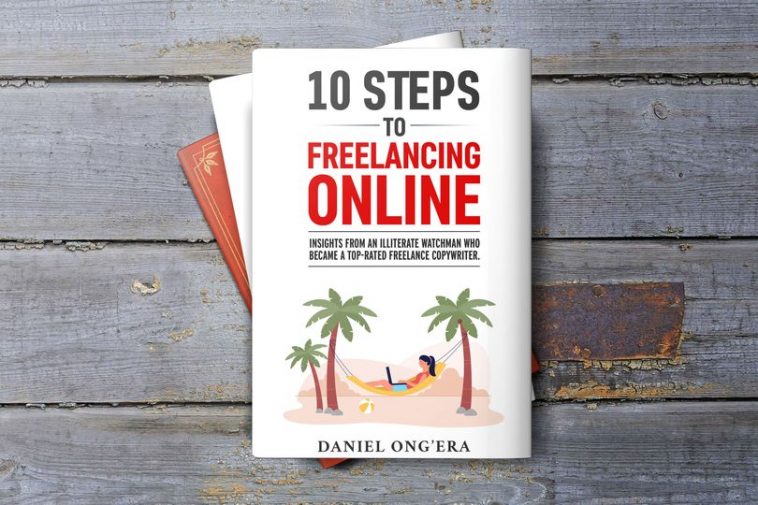For the last year, I have had to wake up at 4 AM every morning to work on this book for two or three hours. Today I am happy to announce that it is ready.
HERE IS THE INTRODUCTION TO THE BOOK.
In 2013, I was a watchman working 72 hours a week for a monthly take-home pay of $150. In 2017, I had turned into a freelance copywriter charging an hourly rate of $50.
In 2013 I had to jump overflowing raw sewage every time I needed to get into or leave my decrepit shack in one of Nairobi’s slums. In 2017, I didn’t live in a slum anymore.
In 2013, I could hardly imagine any serious entrepreneur or business executive giving me 10 minutes of their time. In 2017, I moderated a panel comprising chief executives, senior public officials, and academicians at an international financial technology (Fintech) industry event.
I did not achieve this shift because I am a genius. My intellectual competencies are pretty average.
The schools I went to were far from being the best. The elementary school I attended was mud-walled. The high school I joined after had four rooms, and only one had windows, a door, and a floor.
Let’s say I just somehow stumbled upon a formula. A significant part of it has crystallized in hindsight.
It doesn’t matter whether you are a highly trained expert or an illiterate watchman with a huge dream. You can succeed freelancing online. It could be as a side hustle, part-time, or even a full-time job.
This book gives you a strong foundation to embark on that journey. You stand to learn from the lessons, insights and even mistakes I have accumulated over seven years.
In addition to building a profile, finding work, and effectively pitching to clients, I explain how to achieve a mental shift critical to success.
I also tell you why trying to be the best at one skill or another could be a losing game and what you need to do instead.
I also take you through building a product that a target market can’t resist. I also tell you how to get both internal and external credibility, which you need to capture the attention of potential clients and persuade them to hire you.
I also share unique lessons from my experience, such as why I usually decline video and audio interviews. And my exit strategy from price negotiations, which often gets me the job at double my going rate.
I have organized everything into 10 easy-to-follow steps.
In a nutshell, this is a compilation of the pieces of advice I would have loved to receive as a package when I started in late 2013.
Why should you care about online freelancing?
Freelancing gives you the freedom many only dream of.
It gives you control over how you work, including the hours. You can take breaks when it is convenient for you. For example, if you are a parent, to go outside and play with your child at any time of the day. Or, if you are a free spirit, take a road trip in the middle of the work week simply because you feel you need it.
Freelancing also allows you to live in whatever town, city, part of the country or world you want. You are not tied down to a specific physical location.
If travelling the world has been your dream, freelancing online allows you to turn yourself into a digital nomad—hopping from city to city, country to country while you work to fund your perpetual vacationing state.
You also get to work on only what excites and gives you fulfilment. You can also set your earnings goals and work towards them.
Ultimately, you can grow a business that changes many other lives.
I should point out this was not even supposed to be a book.
It was supposed to be a simple resource page on a Google Doc with easy-to-follow steps. I needed the resource page to easily share tips with many who reached out to me with questions on how to become successful online freelancers.
It had occurred to me that most asked almost the same questions. Instead of repeating myself repeatedly, I figured I could create a page with detailed answers for the frequently asked questions and direct anyone seeking my help there. That way, I would save time and give them a little more comprehensive guide.
However, soon after I began writing, I realized there was a lot I needed to share and explain for the document to make sense and therefore be useful. It got longer and longer. At some point, I thought to myself, ‘why not just turn it into a book?’
If you are in permanent employment today, here is one more reason you need to read this book.
The concept of work is changing. During the COVID-19 pandemic, many businesses and institutions asked their members of staff to work from home. It was a measure taken to curtail the spread of the virus. Some countries saw as much as 50% of the workforce (mostly white-collar) shift to working from home.
However, what might be unknown to many is that the move to work remotely had started to pick speed way before the pandemic. Also, it is a precursor for another major shift.
Indeed, some major companies have alluded to having in place long-term plans to have a significant section of their staff continue working from home long after the pandemic. Facebook is one of those.
“I think that it’s possible that over the next five to 10 years — may be closer to 10 than five, but somewhere in that range — I think we could get to about half of the company working remotely permanently,” Mark Zuckerberg, Facebook’s CEO and founder told The Verge in May 2020.
What could possibly happen next?
The shift to working remotely is enabling the change of the concept of work in another critical way. It is making it possible for businesses and institutions to switch to getting labor on-demand.
Just as businesses and institutions shifted to use software as a service (SaaS) in the late 1990s and early 2000s, they moved towards using labour as a service (LaaS). And technology is making it possible.
The shift is happening. Over 60 million people around the world have thriving online freelancing businesses.
A report that Payoneer, the online money transfer service provider, published in late 2019 showed that the revenue that freelancers generated in the second quarter of that year increased by 78% in the US, 59% UK and 45% Brazil. Other countries that saw impressive growth include the Philippines 35%, India 29% and Bangladesh 27%.
In June 2020, Dr. Adam Ozimek, an expert in labor markets, demographics and immigration, released a report commissioned by the freelancing site Upwork. In it, 47% of 1500 hiring managers surveyed in the US indicated that they leaned more towards hiring independent professionals (freelancers) than employing permanent staff members.
What does all this mean?
It means that online freelancing opportunities are likely to continue expanding. It is also a wake-up call for those in permanent employment today that they need to take some time to learn one or two things about freelancing. They might need these skills not long from today.
While the new work arrangement might seem like a raw deal for the worker, for those who are quick to learn how to package and market themselves, it will be the golden age.
********
Download and read the book on the Amazon Kindle reader. Install the Kindle app from Google Play Store or Apple store (if you don’t have it already. If you need a hard copy locally, reach out to Writers Guild Kenya.
This post was created with our nice and easy submission form. Create your post!





